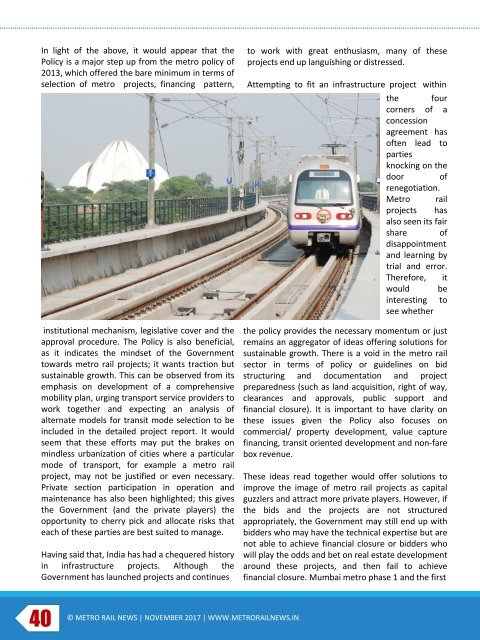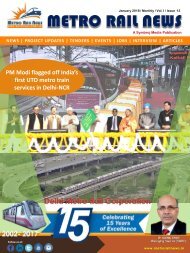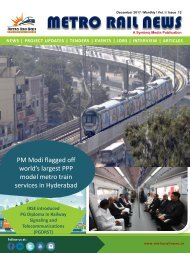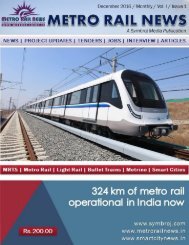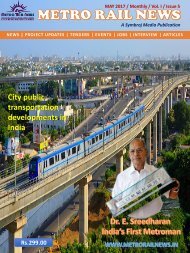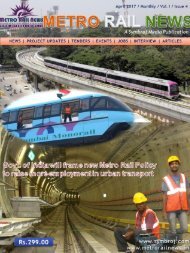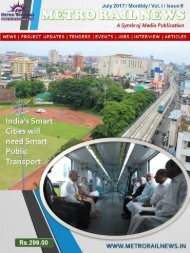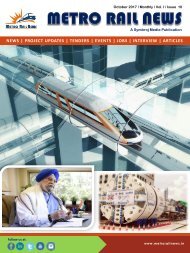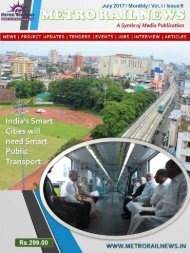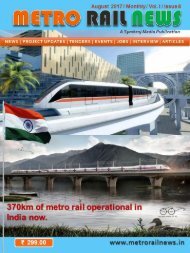Metro Rail News November 2017
Monthly magazine with special focus on Urban Mobility, Metro Rail Projects, Mass Rapid Transit Systems, High Speed Rail Project, Smart Cities Projects etc.
Monthly magazine with special focus on Urban Mobility, Metro Rail Projects, Mass Rapid Transit Systems, High Speed Rail Project, Smart Cities Projects etc.
You also want an ePaper? Increase the reach of your titles
YUMPU automatically turns print PDFs into web optimized ePapers that Google loves.
In light of the above, it would appear that the<br />
Policy is a major step up from the metro policy of<br />
2013, which offered the bare minimum in terms of<br />
selection of metro projects, financing pattern,<br />
institutional mechanism, legislative cover and the<br />
approval procedure. The Policy is also beneficial,<br />
as it indicates the mindset of the Government<br />
towards metro rail projects; it wants traction but<br />
sustainable growth. This can be observed from its<br />
emphasis on development of a comprehensive<br />
mobility plan, urging transport service providers to<br />
work together and expecting an analysis of<br />
alternate models for transit mode selection to be<br />
included in the detailed project report. It would<br />
seem that these efforts may put the brakes on<br />
mindless urbanization of cities where a particular<br />
mode of transport, for example a metro rail<br />
project, may not be justified or even necessary.<br />
Private section participation in operation and<br />
maintenance has also been highlighted; this gives<br />
the Government (and the private players) the<br />
opportunity to cherry pick and allocate risks that<br />
each of these parties are best suited to manage.<br />
Having said that, India has had a chequered history<br />
in infrastructure projects. Although the<br />
Government has launched projects and continues<br />
to work with great enthusiasm, many of these<br />
projects end up languishing or distressed.<br />
Attempting to fit an infrastructure project within<br />
the four<br />
corners of a<br />
concession<br />
agreement has<br />
often lead to<br />
parties<br />
knocking on the<br />
door of<br />
renegotiation.<br />
<strong>Metro</strong> rail<br />
projects has<br />
also seen its fair<br />
share of<br />
disappointment<br />
and learning by<br />
trial and error.<br />
Therefore, it<br />
would be<br />
interesting to<br />
see whether<br />
the policy provides the necessary momentum or just<br />
remains an aggregator of ideas offering solutions for<br />
sustainable growth. There is a void in the metro rail<br />
sector in terms of policy or guidelines on bid<br />
structuring and documentation and project<br />
preparedness (such as land acquisition, right of way,<br />
clearances and approvals, public support and<br />
financial closure). It is important to have clarity on<br />
these issues given the Policy also focuses on<br />
commercial/ property development, value capture<br />
financing, transit oriented development and non-fare<br />
box revenue.<br />
These ideas read together would offer solutions to<br />
improve the image of metro rail projects as capital<br />
guzzlers and attract more private players. However, if<br />
the bids and the projects are not structured<br />
appropriately, the Government may still end up with<br />
bidders who may have the technical expertise but are<br />
not able to achieve financial closure or bidders who<br />
will play the odds and bet on real estate development<br />
around these projects, and then fail to achieve<br />
financial closure. Mumbai metro phase 1 and the first<br />
40<br />
© METRO RAIL NEWS | NOVEMBER <strong>2017</strong> | WWW.METRORAILNEWS.IN


